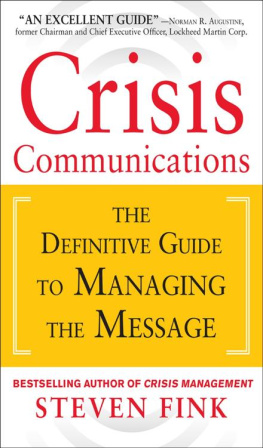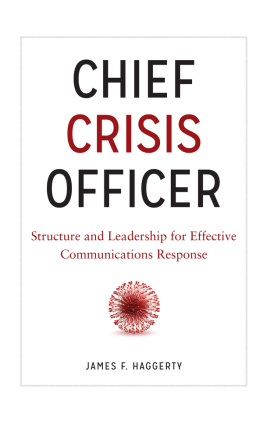Steven Fink - Crisis Communications: The Definitive Guide to Managing the Message
Here you can read online Steven Fink - Crisis Communications: The Definitive Guide to Managing the Message full text of the book (entire story) in english for free. Download pdf and epub, get meaning, cover and reviews about this ebook. year: 2013, publisher: McGraw-Hill Education, genre: Business. Description of the work, (preface) as well as reviews are available. Best literature library LitArk.com created for fans of good reading and offers a wide selection of genres:
Romance novel
Science fiction
Adventure
Detective
Science
History
Home and family
Prose
Art
Politics
Computer
Non-fiction
Religion
Business
Children
Humor
Choose a favorite category and find really read worthwhile books. Enjoy immersion in the world of imagination, feel the emotions of the characters or learn something new for yourself, make an fascinating discovery.
- Book:Crisis Communications: The Definitive Guide to Managing the Message
- Author:
- Publisher:McGraw-Hill Education
- Genre:
- Year:2013
- Rating:5 / 5
- Favourites:Add to favourites
- Your mark:
- 100
- 1
- 2
- 3
- 4
- 5
Crisis Communications: The Definitive Guide to Managing the Message: summary, description and annotation
We offer to read an annotation, description, summary or preface (depends on what the author of the book "Crisis Communications: The Definitive Guide to Managing the Message" wrote himself). If you haven't found the necessary information about the book — write in the comments, we will try to find it.
Steven Fink: author's other books
Who wrote Crisis Communications: The Definitive Guide to Managing the Message? Find out the surname, the name of the author of the book and a list of all author's works by series.
Crisis Communications: The Definitive Guide to Managing the Message — read online for free the complete book (whole text) full work
Below is the text of the book, divided by pages. System saving the place of the last page read, allows you to conveniently read the book "Crisis Communications: The Definitive Guide to Managing the Message" online for free, without having to search again every time where you left off. Put a bookmark, and you can go to the page where you finished reading at any time.
Font size:
Interval:
Bookmark:
Also by Steven Fink
Nonfiction
Crisis Management: Planning for the Inevitable
Sticky Fingers: Managing the Global Risk of Economic Espionage
Fiction
The Hailing Sign


Copyright 2013 by Steven Fink. All rights reserved. Except as permitted under the United States Copyright Act of 1976, no part of this publication may be reproduced or distributed in any form or by any means, or stored in a database or retrieval system, without the prior written permission of the publisher.
ISBN: 978-0-07-179922-5
MHID: 0-07-179922-2
The material in this eBook also appears in the print version of this title: ISBN: 978-0-07-179921-8, MHID: 0-07-179921-4.
All trademarks are trademarks of their respective owners. Rather than put a trademark symbol after every occurrence of a trademarked name, we use names in an editorial fashion only, and to the benefit of the trademark owner, with no intention of infringement of the trademark. Where such designations appear in this book, they have been printed with initial caps.
McGraw-Hill Education eBooks are available at special quantity discounts to use as premiums and sales promotions, or for use in corporate training programs. To contact a representative please e-mail us at bulksales@mcgraw-hill.com.
TERMS OF USE
This is a copyrighted work and McGraw-Hill Education and its licensors reserve all rights in and to the work. Use of this work is subject to these terms. Except as permitted under the Copyright Act of 1976 and the right to store and retrieve one copy of the work, you may not decompile, disassemble, reverse engineer, reproduce, modify, create derivative works based upon, transmit, distribute, disseminate, sell, publish or sublicense the work or any part of it without McGraw-Hill Educations prior consent. You may use the work for your own noncommercial and personal use; any other use of the work is strictly prohibited. Your right to use the work may be terminated if you fail to comply with these terms.
THE WORK IS PROVIDED AS IS. MCGRAW-HILL EDUCATION AND ITS LICENSORS MAKE NO GUARANTEES OR WARRANTIES AS TO THE ACCURACY, ADEQUACY OR COMPLETENESS OF OR RESULTS TO BE OBTAINED FROM USING THE WORK, INCLUDING ANY INFORMATION THAT CAN BE ACCESSED THROUGH THE WORK VIA HYPERLINK OR OTHERWISE, AND EXPRESSLY DISCLAIM ANY WARRANTY, EXPRESS OR IMPLIED, INCLUDING BUT NOT LIMITED TO IMPLIED WARRANTIES OF MERCHANTABILITY OR FITNESS FOR A PARTICULAR PURPOSE. McGraw-Hill Education and its licensors do not warrant or guarantee that the functions contained in the work will meet your requirements or that its operation will be uninterrupted or error free. Neither McGraw-Hill Education nor its licensors shall be liable to you or anyone else for any inaccuracy, error or omission, regardless of cause, in the work or for any damages resulting there from. McGraw-Hill Education has no responsibility for the content of any information accessed through the work. Under no circumstances shall McGraw-Hill Education and/or its licensors be liable for any indirect, incidental, special, punitive, consequential or similar damages that result from the use of or inability to use the work, even if any of them has been advised of the possibility of such damages. This limitation of liability shall apply to any claim or cause whatsoever whether such claim or cause arises in contract, tort or otherwise.
In Memoriam
Harriet Braiker, Ph.D.
She touched the world
and left her handprint on our hearts
mine, most especially.
And for:
Judy Ellis
Kay Jamison
Matt Rainwater
Sheryl Sandberg
Friends in deed,
Friends indeed.
And Amanda,
Torchbearer extraordinaire.
What weve got here is failure to communicate.
from Cool Hand Luke
Some years ago, I wrote Crisis Management: Planning for the Inevitable, the first book ever written on the subject. It took the position, as the subtitle boldly asserts, that today, a crisis in business is as inevitable as death and taxes; it is not a question of if, but rather when. The passing years have only reinforced that ironclad belief, and I daresay the universebolstered by sad history lessons and a veritable graveyard littered with companies and managers that have fallen victim to all manner of crisesagrees with me.
In that book, and at that time, I believed that I had included everything that needed to be said about crisis communications. In fact, I devoted two full chapters to the subject, one subtitled Controlling the Message and the other Handling a Hostile Press. At the time, that was sufficient.
But that was before the Internet explosion and the advent of never-ending 24/7 news cycles, cell phone videos, the runaway profusion of still emerging social media, ever-lurking-in-the-bushes paparazzi, blogs and websites devoted to gotcha journalism, and electronic mob-mentality consumerism/activism. There was a time when a client of mine could make a verbal gaffe to a reporter in the morning and I had time to correct the statement and rehabilitate the client before the afternoon news cycle began and the clients ill-chosen words got out in print or made the evening news. Those halcyon days are long gone, never to return.
The truth is, even the phrase 24/7 sounds antiquated today. Were really talking about an instantaneous, live news stream; you cant use the word cycle, since that implies a beginning, an end, and a restart. And woe to any company whose crisis communications strategy is not prepared for that phenomenon, especially since in this current paradigm, where risks have magnified exponentially and where news and pseudonews break in the blinking of an eye, the risk of inaccuracies and resulting damage to businesses and reputationsreal or imaginedis huge.
Also, there seems to be a new generation of business leaders (and politicians and celebrities, too) who think that theyre above the strict laws of crisis communications or think that theyre smarter than a horde of ravenous, take-no-prisoners reporters and cell phone videographers. They think their verbal gymnastics skills can extricate them from any trouble they find themselves in, especially trouble of their own making. Or worse, they clam up, adopt a bunker mentality, and refuse to talk to the media or to their constituencies when that is exactly what they should be doing. What these so-called leaders and newsmakers fail to realize is that reporters are smarter than they areand they always have the last word. Even if you believe thats not true, its more prudent to act as though it were. As some wise wag once quipped, Never pick a fight with anyone who buys ink by the barrel.
Benchmarks in crisis management and its important counterpart, crisis communications, have been well established and long recognized as essential corporate business disciplines since 1979, the year of the infamous Three Mile Island nuclear accident. According to the New York Times, it was during that then-unprecedented disaster and near catastrophe that modern-day corporate crisis management was born. It was then that the world first saw a side-by-side comparison of both good and bad crisis management and crisis communications in the form of the management and communication skills of the Office of the Governor of the Commonwealth of Pennsylvania (the former) and the Metropolitan Edison utility company, the nuclear plant operator (the latter). In fact, the utility companys crisis communications pronouncements were so problematic, so misleading, and so frightening to the public at large that the White House took the unprecedented step of gagging the company by ordering it to stop issuing
Next pageFont size:
Interval:
Bookmark:
Similar books «Crisis Communications: The Definitive Guide to Managing the Message»
Look at similar books to Crisis Communications: The Definitive Guide to Managing the Message. We have selected literature similar in name and meaning in the hope of providing readers with more options to find new, interesting, not yet read works.
Discussion, reviews of the book Crisis Communications: The Definitive Guide to Managing the Message and just readers' own opinions. Leave your comments, write what you think about the work, its meaning or the main characters. Specify what exactly you liked and what you didn't like, and why you think so.











